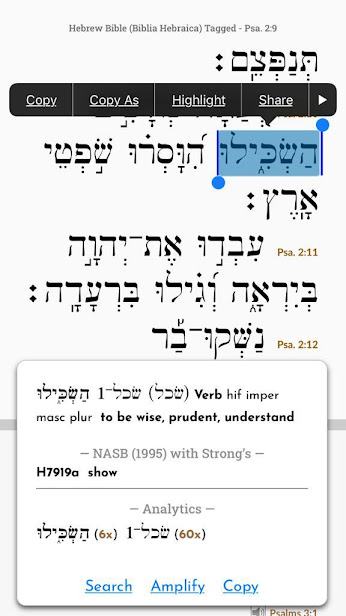You have probably asked why formal Hebrew classes using a textbook are important? Why can't you learn Hebrew ad hoc?
If you look at the word that I have highlighted in the text, you will see it begins with the prefix 'ha'. Most of you would have thought of interpreting it immediately as 'the' (definite article) but how can it be 'the' when the word is a verb? You know that, even in English, you cannot put a definite article to a verb. The definite article is only in front of a noun but what if 'ha' is in front of or before (prefixed to) a verb?
If you look at the popped-up dictionary on Accordance Bible, it shows 'hifil imperfect'. After you have gone through the Hebrew classes, you will understand what is 'hifil imperfect'.
Why Textbook?
The beauty of doing it using a textbook is that, after you have forgotten what is the meaning of hifil, you roughly know where to refer in the textbook. You won't be able to do this if you attend classes ad hoc here and there. Ad hoc classes will give you only very superficial understanding of Hebrew and it is superficial learning of Hebrew that leads to all the wrong interpretations of the Bible. You will have people saying Jehovah is 'the god of destruction' or even 'the name of the supremely evil.' This is all theological rubbish to me!
What is causative? It means an action caused by someone or something. For example, the king is `made great' by the Lord. You have the king on one hand and the Lord on the other hand. If the word 'gadol' (adjective,'great') is added a prefix 'hey' to become 'higdil' (a hifil), the word now suggests that it is the Lord who made the king great.
Yes, you won't see it now! But, trust me, if you are patient to go through the formal classes to learn the language proper, you will understand Hebrew so much better.
In this case, the word 'haskilu' is a hifil imperfect masculine plural which means 'to be wise, prudent, understand.' By this, once you have learnt the language proper, you will understand that it is causative (verb shows there is a cause/effect involved here), imperfect and the shuruk used as a suffix (attached to the end of the word) refers to masculine plural (a group of men).
Then, you will understand that this verb 'haskilu' refers to the kings. Kings are men and plural. Then, when you look at the context of the sentence, you will learn that the psalmist was urging the kings to (cause) show wisdom in their judgement.
You can therefore safely translate this part of the verse as '
Cause all your judgements to be wise, O kings!"
or 'O kings, apply discernment to (or wisdom in) your judgements.'
The NASB translates it as 'Now, therefore, O kings, show discernment'. The English translation is static. That's why you are asked sometimes to refer to different English translations. That is the best you can do but you won't know what is the original text to be able to appreciate the meaning more. There is a lot more to the Hebrew used in the Old Testament.
Once you know the text in the original language, you can give your own variety to the translation so long as it does not deviate from the rules that govern the language or out of the context of the verse.
Other things that you will see when you read the Old Testament in its original language:
(a) You will also learn that the name Absalom means 'father of peace.' When David named his Absalom, he had good intentions for him to be a father of peace. Instead, Absalom never lived up to his reputation.
(b) Look at this blogpost and you will understand why I say it is theological rubbish when I heard a video of a Westerner who taught that the hey added to Abram's name gave him a new zest of life. In the message I saw on video, this guy was basically introducing Eastern form of Transcendental Meditation when he told people to breathe in and breathe out the name YHWH.
Some local pastors are adopting this 'hey' and teaching in churches as a way to interpret Hebrew! Sadly, many are being misled as a result. As the Lord said in the last days, many false prophets and false Christs will arise and lead even the elect astray. We have to be extra cautious these days especially with the accessibility to all sorts of teachings on the Internet. We need to be properly equipped with the word of God to safeguard our faith.







No comments:
Post a Comment